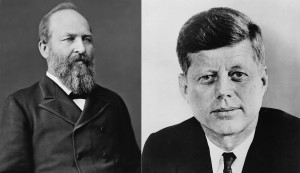In our nation’s history, close to 20% of our presidents have died in office, either through assassination or death. Some of their terms were very short, thus making it difficult for historians to assess their performance during their brief tenure. But two presidents who died in office stand out as having had the potential to be great presidents.
Which Presidents died in office? Here’s a list of the presidents who died in office, how long they were president, and the cause of death:
- William Henry Harrison (32 days; pleurisy, pneumonia)
- Zachary Taylor (1 year, 127 days; bilious fever, typhoid fever, cholera morbus)
- Abraham Lincoln (4 years, 42 days; assassination)
- James A. Garfield (199 days; assassination)
- William McKinley (4 years, 194 days; assassination)
- Warren G. Harding (2 years, 151 days; apoplexy, pneumonia, enlargement of the heart)
- Franklin D. Roosevelt (12 years, 39 days; cerebral hemorrhage)
- John F. Kennedy (2 years, 306 days; assassination)
Great Presidents: Of these eight men who died in office, most polls and surveys on presidential greatness always rank Lincoln and Franklin Roosevelt among the top three best presidents. Despite death cutting short their full term, these two men achieved greatness in the time they did serve. Of course, FDR served more than a dozen years, and Lincoln had just over one full term as president.
Weak Presidents: Four of the eight who died in office are generally considered weaker presidents, and it is doubtful that they would rank higher on presidential greatness had they lived longer. These include William Henry Harrison, Zachary Taylor, William McKinley, and Warren Harding. Of this list, Harding is frequently ranked as one of our worst presidents. McKinley was a middle-of-the-road president in terms of performance – not bad and not great.
Potentially great Presidents: That leaves two presidents, who both died of an assassin’s bullet, who had the potential to be truly great presidents: James Garfield and John F. Kennedy. Both of these men had a combination of traits that could have propelled them into the nation’s memory as great presidents. They were both intelligent, charismatic, and pragmatic.
- James Garfield: Garfield, of course, didn’t have long to make his mark on the presidency as his term
was cut short after just over six months. Many people have never even heard of Garfield, but he was a uniquely gifted man. I recently read a book on Garfield that gave me a new appreciation for this man: Destiny of the Republic: A Tale of Madness, Medicine, and the Murder of a President, by Candice Millard.
- John F. Kennedy: JFK had longer in office than Garfield and he consistently ranks high on surveys of presidential performance, even with his abbreviated term of office. While some are critical of Kennedy’s presidency, he demonstrated an ability to learn quickly from his mistakes, and could have served the country well had he finished his term and been re-elected. And, of course, there are the great “what if” questions of history. Would the United States have become embroiled in Vietnam under a Kennedy presidency like it was under Lyndon Johnson’s tenure?
What makes a great President? I suggest it is this combination of intelligence, charisma, and pragmatism that serve as good markers for not only evaluating presidential greatness, but for assessing candidates for the nation’s highest office.
- Intelligence: The country is best served when the president is inherently smart and knows how to assess often conflicting opinions and information and make appropriate decisions. Part of intelligence is the ability to learn and grow with the office.
- Charisma: Presidents with charisma demonstrate likeability, good communication skills, and are comfortable with themselves.
- Pragmatism: Pragmatic presidents, while holding their own political beliefs, understand that in our republic, the role of the president is to govern effectively for the good of the entire nation. This often involves crafting compromises in which the overall public interest is served, and involves careful listening to and reaching out to those with different political opinions in order to reach solutions for the good of the nation.
Another way to ask this question of what makes a great president is to ask which presidents could be considered geniuses. Click here to see a 6.5 minute video with answers from two presidential historian. Who would you pick as the best presidents or which ones would you consider to be a genius?


 Facebook
Facebook
 Twitter
Twitter
 LinkedIn
LinkedIn
 YouTube
YouTube
 Pinterest
Pinterest